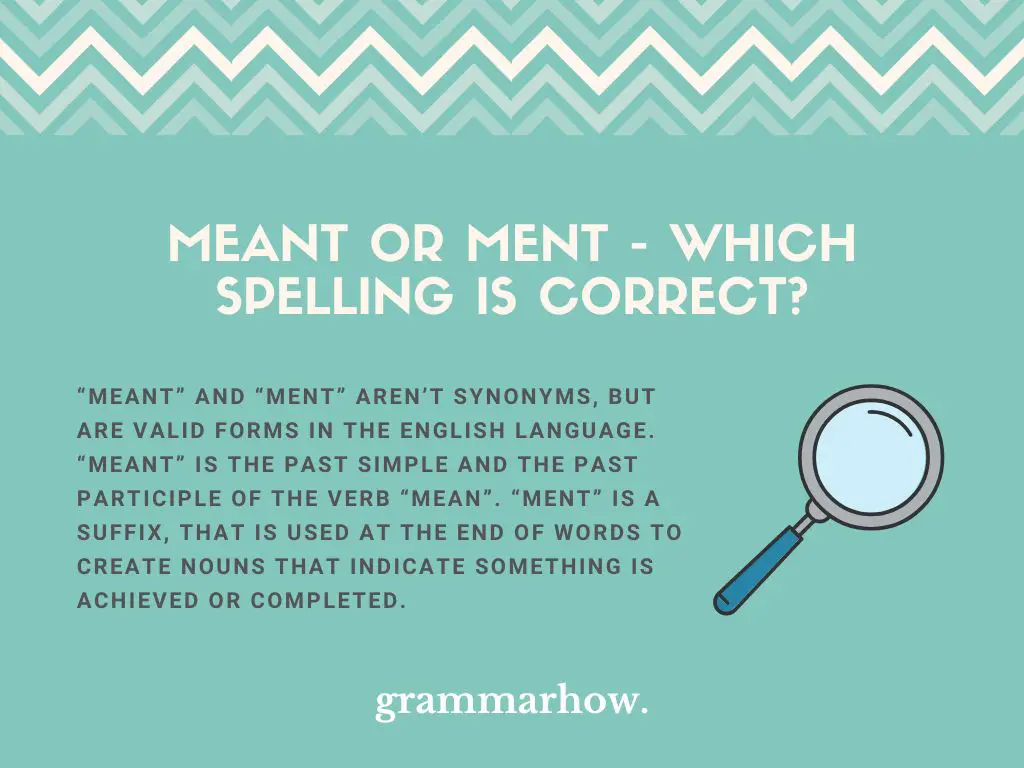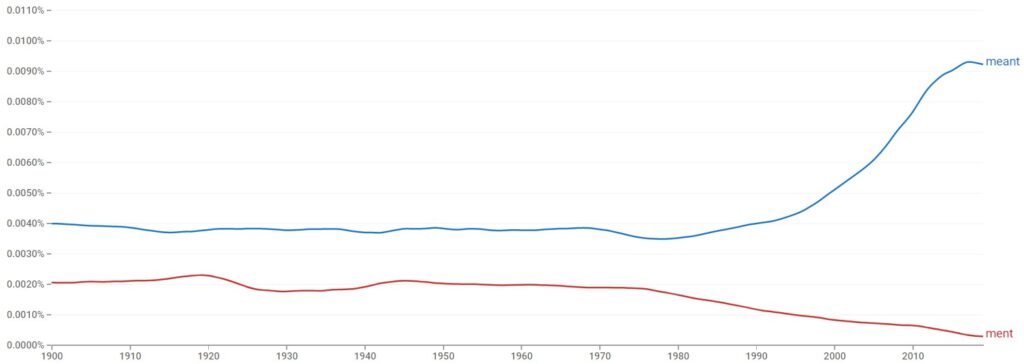“Meant” and “Ment” sound the same. But are those words synonyms?
We want to know which is the correct spelling, when comparing “Meant” and “Ment”. We also want to know what they mean and which of those forms should be avoided. Let’s discover the proper way to use those words.
Meant or Ment – Which Spelling Is Correct?
“Meant” and “Ment” aren’t synonyms, but are valid forms in the English language. “Meant” is the past simple and the past participle of the verb “Mean”. “Ment” is a suffix, that is used at the end of words to create nouns that indicate something is achieved or completed.

Take a look at some examples:
- Frankie ment to say something different. (incorrect)
- Frankie meant to say something different.
- Running a marathon is quite an achievement.
- Parents should keep the focus on their child’s development.
The first set of examples is about things that Frankie may or may not have intended to say. Maybe they “Meant” it, maybe they didn’t. The point is that “Ment” means nothing in that context and doesn’t work as a stand-alone word. Only “Meant” is acceptable here.
The second set of examples brings words that use the suffix “-Ment” to make sense and convey their meanings: “achievement” and “development”. There are many others, because “-Ment” is a suffix we use a lot. Now you know what it means and what’s its purpose.
Meant
“Meant” is the past tense and the past participle of the verb “Mean”, which is to express or represent something, such as an idea, thought, or fact. Whenever you need to refer to this concept in the past tense, you should use “Meant”.
The Cambridge Dictionary expands on the meaning of “Mean” and, consequently, the meaning of “Meant”: “to have a particular result, to intend”.
Take a look at some examples:
- I hadn’t meant to say that and I want to apologize.
- She meant well but her actions backfired.
- I wasn’t meant to be here but I’m happy I am.
- Laura said it meant nothing at all.
- I think this isn’t what Howerd meant by his words.
Ment
“Ment’ isn’t a word, especially not an alternate form for the word “Meant”. But it’s a very important suffix in the English language, that indicates achievements or concrete things.
According to The Cambridge Dictionary, the suffix “-ment” is “used to form nouns that refer to an action or process, or its result”.
Let’s take a look at some examples that include words that contain the suffix “-ment”.
- Do you know when the payment is due?
- Wow, what an achievement!
- This is a great disappointment, you know?
- I need to speak to management about what happened today.
- Don’t make any sudden movements.
Every sentence includes a word that contains the “-ment” suffix: “payment”, “achievement”, “disappointment”, etc. “-ment” doesn’t stand on its own as a word, but it plays a relevant part in the English language as a complement that allows for nouns to make sense and convey the correct meaning.
Which Is Used the Most?
We have a guess as to which one of those forms is used more often. But we are curious to see the graph anyways. Do you think people use more “Meant” or “Ment”?
Take a look at the graph from Google Ngram Viewer below to find out.

“Meant” is the prevalent word, which is used much more often. The graph shows that this word has been increasing considerably in usage since 1980, which indicates that people are using it now even more than they used to use it before.
“Ment”, on the other hand, seems to be decreasing in use. We’re not sure, however, if the graph should be taken into consideration when evaluating the importance of the prefix “-Ment”.
Since the suffix “-ment” is always attached to another word, we think the graph may not be reflecting all instances in which “-ment” is used. Nevertheless, “Meant” is the form that appears more and that’s what counts for us here.
Final Thoughts
“Meant” and “Ment” are relevant forms in the English language, but have different meanings and purposes. “Meant” is simply the past simple and the past participle of the verb “Mean”. “Ment” is a suffix that, when attached to words, creates nouns that refer to things that are achieved or completed.

Martin holds a Master’s degree in Finance and International Business. He has six years of experience in professional communication with clients, executives, and colleagues. Furthermore, he has teaching experience from Aarhus University. Martin has been featured as an expert in communication and teaching on Forbes and Shopify. Read more about Martin here.
